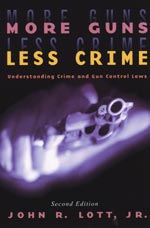The Supreme Court and the Chicago gun ban

With the Supreme Court due to hear arguments tomorrow in a suit challenging Chicago’s ban on handguns in the city, Chicago Public Radio’s Eight Forty-Eight aired the second of a two part special on the history of Chicago’s ban this morning. On the program contributor Robert Loerzel walks through some of the major events—including the tragic assassination of Martin Luther King Jr. and the ensuing riots on Chicago’s South Side, the assassination of J.F.K., and even the attempted murder of Pope John Paul II—that helped to gain public support for Chicago’s handgun ordinance.
But despite the mountains of negative publicity that guns have received, especially in the nation’s urban centers, the question of whether allowing people to own or carry guns deters violent crime still remains.
Back in 2000 the University of Chicago Press published one of the most influential and controversial books on the issue, John R. Lott, Jr.’s More Guns, Less Crime: Understanding Crime and Gun Control Laws. Slated for an updated third edition later this month, Lott’s book employs some of the most rigorously comprehensive data analysis ever conducted on crime statistics and right-to-carry laws to directly challenge common perceptions about the relationship between guns, crime, and violence. For the third edition, Lott draws on an additional ten years of data—including provocative analysis of the effects of gun bans in Chicago and Washington, D.C.—to bring the book fully up to date and further bolster its central contention that, in fact, more guns mean less crime.
Tune your radio to 91.5 tomorrow to catch more analysis on the challenge to Chicago’s gun control ordinance, or navigate to the Chicago Public Radio website to listen to the archived audio from this morning’s program.
Also navigate to the press website to read an interview with John R. Lott Jr. or to find out more about the updated third edition.